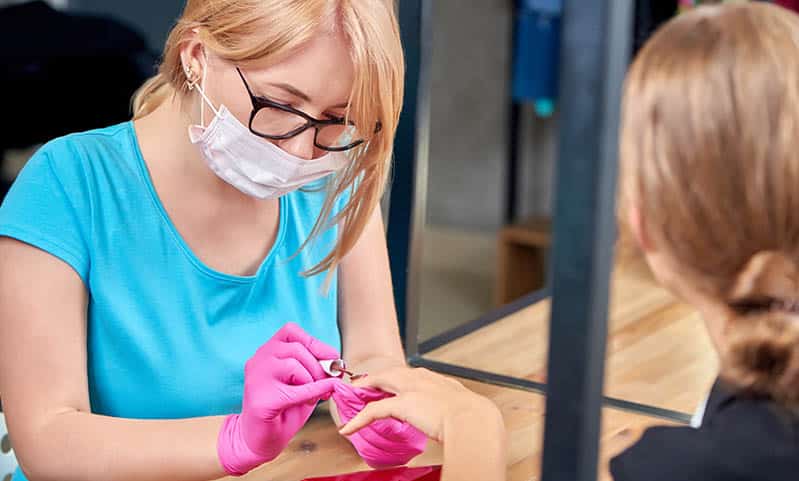Earlier this month, the New York Nail Salon (NYC) Workers Association organized a speak-out protesting on-going abuses against salon workers in front of New York City chain Envy Nails’s Bronx location. Around 40 women showed up and spoke out against the injustices they face as salon workers, single mothers, and immigrants. They told stories of the emotional and physical toll that comes with painting nails and how state-wide reforms have not been enough.
This issue is not new for Envy, nor for the industry at large. In 2016, Envy settled in a 2013 class action lawsuit where workers accused the company of wage theft. The company denied these claims. Being overworked and underpaid in dangerous conditions are endemic of the industry. It is one that has always been plagued by wage theft and worker abuses, relying on the exploitation of immigrant women. For many nail technicians, their immigrant status forces them to be silent about workplace mistreatment. This is true now more than ever as ICE raids intensify. Deportation and unemployment are not risks these women can take.
A New York Times investigation in 2015 uncovered a number of health and labor violations leading to new ventilation standards in salons throughout New York City. Salon owners in 143 salons paid more than $2 million in damages and were required to provide employees with better protective equipment. These reforms have not been completely successful as salon owners continue to disregard regulations that are not strictly enforced anyway. Conditions remain poor, not just in New York but country-wide.
As the investigation exposed, nail salon workers are paid vastly below minimum wage (as little as $1.50 an hour) with no overtime pay, and sometimes they’re not paid at all. The lower the salon prices, the higher the likelihood that workers are not being paid nearly enough for the 10 to 12-hour workdays, six to seven days a week. They rely on customers’ tips to make money and under state and federal labor laws are not required to be paid minimum wage. Many are only paid based on commission, meaning if there are no customers that day, they don’t get paid.
The investigation also exposed cases where wages were illegally withheld as punishment by salon owners. Health coverage, paid time off, 401(k)’s, and even lunch breaks are not given to nail salon workers. Because of their status as independent contractors, these women cannot unionize, making it harder for them to sue for workplace violations, sexual harassment, and racial discrimination.
Salon workers are subject to verbal and physical abuses not only by managers but also by entitled customers.
Beyond all this, the nature of the work itself is dangerous. Working with chemicals with inadequate or no protective gear leads to lung and eye diseases, miscarriages and other reproductive problems, and cancer.
Government agencies that are supposed to be overseeing these companies are not doing their job, and give no protection to salon workers too afraid to come forward about the abuses.
The NYNSWA-lead protest last Tuesday made clear that little has changed in the industry despite the 2016 reforms. Workers called for proper ventilation, an end to wage theft, mandatory trainings on health and safety, and place for lunch breaks away from chemicals. The speak-out is the first of many to come in the organization’s #HealthDignityJustice campaign.
NYNSWA has been organizing since 2016 to improve working conditions for nail salon workers across the state. They offer know-your-rights workshops on immigration law, labor law, and health and safety rights.
They have a free nail licensing program for workers to obtain a “Nail Specialty License” and offer literacy classes for non-English speakers. Currently their membership consists of 700 immigrant women nail salon workers.
Their desire to reform the exploitative industry extends beyond New York to neighboring states where members visit salons, and even to the West Coast where members work with similar nail salon worker organizations. As many of the workers’ stories reflected at the speak-out, over 33% of NYNSWA members are single mothers. The money they earn is barely enough to afford rent and food for their families, or to hire babysitters so they can continue working.
They miss out on spending quality time with their children. Many expressed the pain of feeling like they are absent mothers.
Nail salon workers organizing and standing up to the mistreatment they endure by their employers and the system as a whole is the only way change will be affected in an industry rampant with health, safety, and wage abuses.
Nail salon clients can do their part by treating their manicurists with respect and tipping them well.
